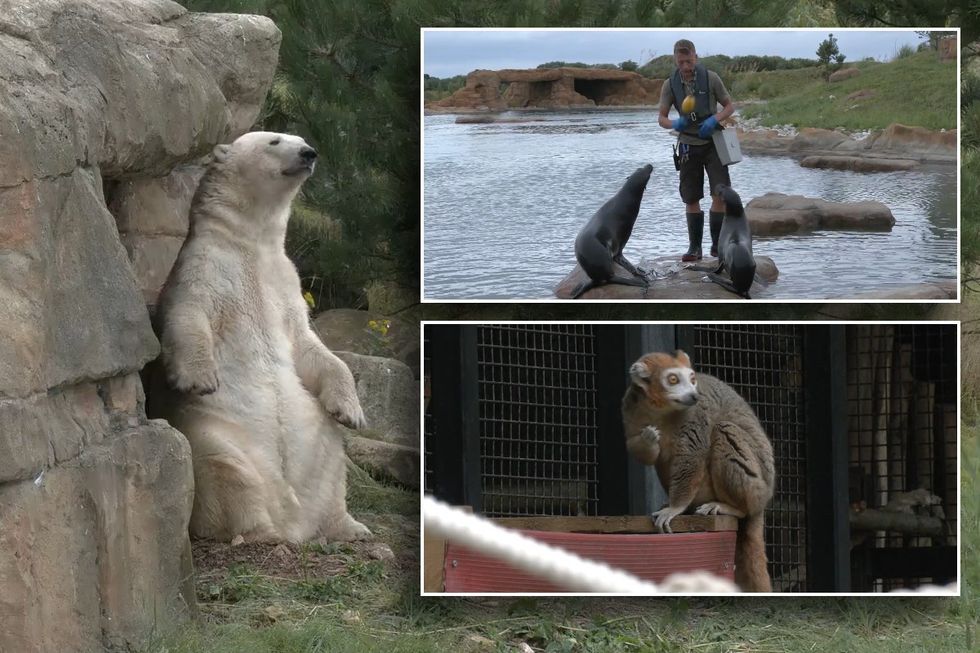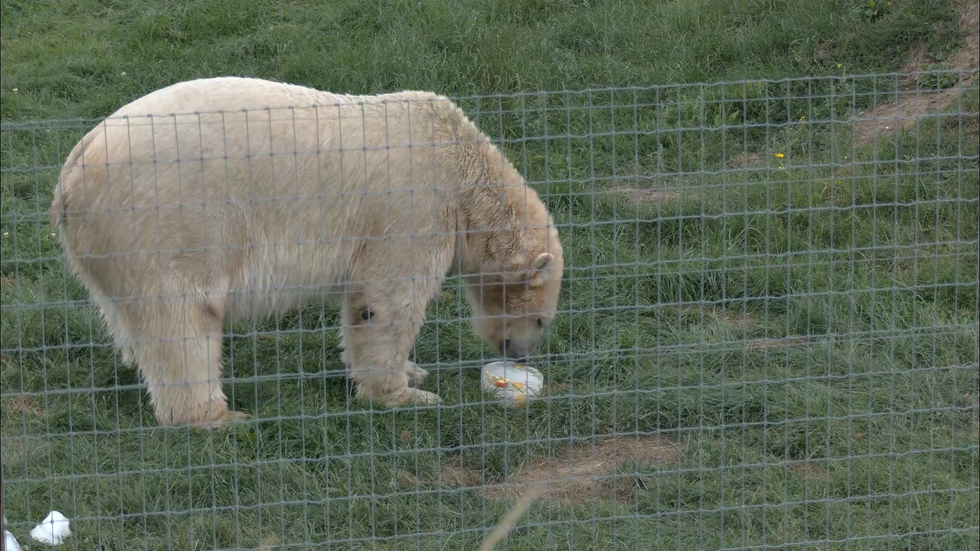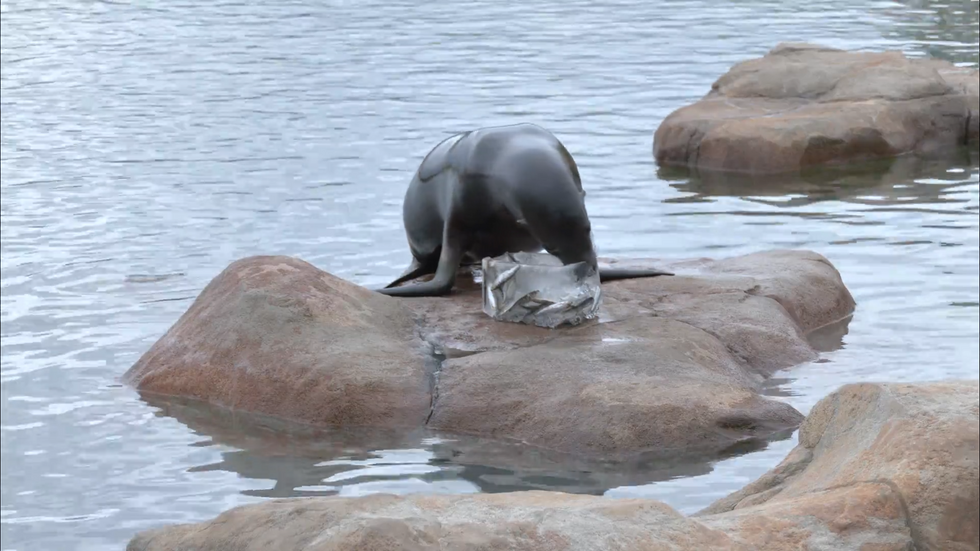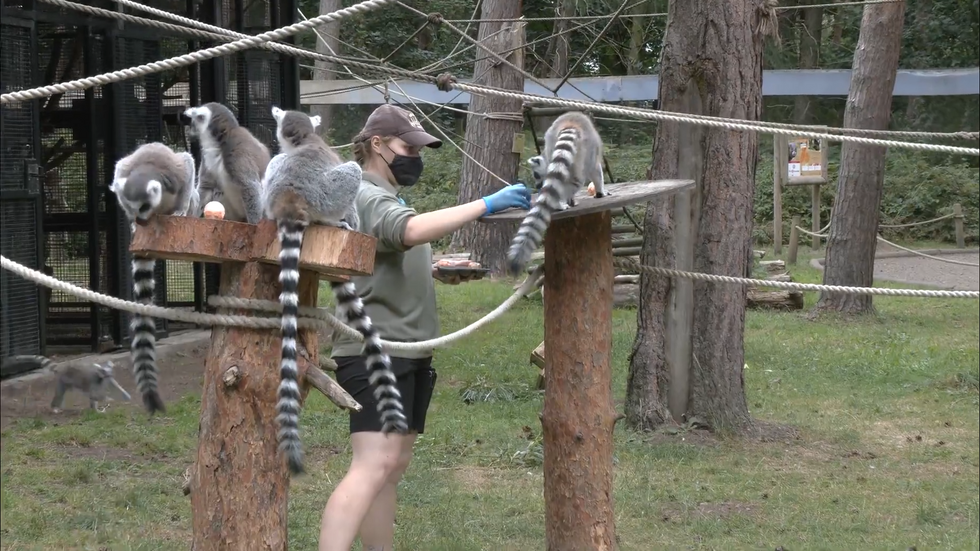Millions of Britons are set to bask in a heatwave this week with weather maps showing that multiple areas of England could see temperatures go over 30C today.
As well as advice being issued on how we can keep cool during the hot weather, rangers across animal parks and zoos are also putting measures in place to protect animals from the high temperatures.
But with record temperatures expected this week, just how do zoos keep their cooler creatures, cold?
GB News visited Yorkshire Wildlife Park, where their six polar bears were enjoying a vegetable ice block.

"For polar bears, they do have quite a variety of different temperatures that they naturally do find," said Josh Bufton, Senior Carnivore Ranger at Yorkshire Wildlife Park.
"Once they're moving off these polar ice caps, they are in the likes of down in the areas of Canada and Hudson Bay.
"Naturally, they were finding polar bears in 35C temperatures year upon year. So they are very much used to warm temperatures and heatwaves.
"As such, what you'll tend to find is they'll go for a good swim and then go for a snooze in the shade thereafter."
LATEST FROM YORKSHIRE:- Visitors transported back in time at North Yorkshire Moors Railway 2024 Diesel Gala
- One person dies in North Yorkshire mudslide with emergency services urging public to avoid area
- ‘Bring back corporal punishment!’ People in Yorkshire react to plans to tackle knife crime

Yorkshire Wildlife Park is also home to Californian Sea Lions, who are native to the Western Coast of North America, and their Natural habitat ranges from Alaska to Central Mexico.
They live in a purpose-built enclosure, called Point Lobos, which was officially opened in November 2021 by Prince Edward, Duke of Edinburgh.
Its 70-meter pool is the biggest purpose-built sea lion pool in the world and is filled with three million litres of water.

To keep cool, the sea lions were treated to a huge fish lolly. Jake Ibbetson, Animal Ranger, Yorkshire Wildlife Park, said: "In the hot weather, it's really important to give them ice because these guys, they don't drink saltwater.
"These pools are actually saltwater pools. They actually drink freshwater. They've got two freshwater pools in their house. But again, being able to provide that in their outside enclosure is also really important.
"So offering them ice with their fish is not only enriching, but it's actually beneficial to their welfare as well."

Other animals like the lemurs, will be basking in the sun but also cooling down with frozen sweet potato during the heatwave.
Ashleigh Nolder, Animal Ranger at Yorkshire Wildlife Park, told GB News: "So we've got three different species of lemur here and they come in all different shapes, colours and sizes, but they are native to Madagascar.
"Madagascar can get quite hot, understandably. So, throughout the cold months here in Yorkshire, we do give them a nice heated house all year round to make sure they're as nice and warm as possible.
"It does mean as well that in the hot spells, we're able to keep our eyes on them and try and give them things which make them a bit more comfortable with that incoming hot weather as well."
from GB News https://ift.tt/XuzZ0lP
Millions of Britons are set to bask in a heatwave this week with weather maps showing that multiple areas of England could see temperatures go over 30C today.
As well as advice being issued on how we can keep cool during the hot weather, rangers across animal parks and zoos are also putting measures in place to protect animals from the high temperatures.
But with record temperatures expected this week, just how do zoos keep their cooler creatures, cold?
GB News visited Yorkshire Wildlife Park, where their six polar bears were enjoying a vegetable ice block.

"For polar bears, they do have quite a variety of different temperatures that they naturally do find," said Josh Bufton, Senior Carnivore Ranger at Yorkshire Wildlife Park.
"Once they're moving off these polar ice caps, they are in the likes of down in the areas of Canada and Hudson Bay.
"Naturally, they were finding polar bears in 35C temperatures year upon year. So they are very much used to warm temperatures and heatwaves.
"As such, what you'll tend to find is they'll go for a good swim and then go for a snooze in the shade thereafter."
LATEST FROM YORKSHIRE:- Visitors transported back in time at North Yorkshire Moors Railway 2024 Diesel Gala
- One person dies in North Yorkshire mudslide with emergency services urging public to avoid area
- ‘Bring back corporal punishment!’ People in Yorkshire react to plans to tackle knife crime

Yorkshire Wildlife Park is also home to Californian Sea Lions, who are native to the Western Coast of North America, and their Natural habitat ranges from Alaska to Central Mexico.
They live in a purpose-built enclosure, called Point Lobos, which was officially opened in November 2021 by Prince Edward, Duke of Edinburgh.
Its 70-meter pool is the biggest purpose-built sea lion pool in the world and is filled with three million litres of water.

To keep cool, the sea lions were treated to a huge fish lolly. Jake Ibbetson, Animal Ranger, Yorkshire Wildlife Park, said: "In the hot weather, it's really important to give them ice because these guys, they don't drink saltwater.
"These pools are actually saltwater pools. They actually drink freshwater. They've got two freshwater pools in their house. But again, being able to provide that in their outside enclosure is also really important.
"So offering them ice with their fish is not only enriching, but it's actually beneficial to their welfare as well."

Other animals like the lemurs, will be basking in the sun but also cooling down with frozen sweet potato during the heatwave.
Ashleigh Nolder, Animal Ranger at Yorkshire Wildlife Park, told GB News: "So we've got three different species of lemur here and they come in all different shapes, colours and sizes, but they are native to Madagascar.
"Madagascar can get quite hot, understandably. So, throughout the cold months here in Yorkshire, we do give them a nice heated house all year round to make sure they're as nice and warm as possible.
"It does mean as well that in the hot spells, we're able to keep our eyes on them and try and give them things which make them a bit more comfortable with that incoming hot weather as well."



0 Comments
Don't share any link